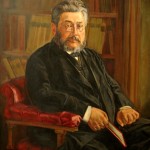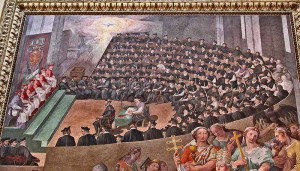 “Never does a person see any beauty in Christ as a Savior, until they discover that they are a lost and ruined sinner.” – J.C. Ryle
“Never does a person see any beauty in Christ as a Savior, until they discover that they are a lost and ruined sinner.” – J.C. Ryle
“The devil is a better theologian than any of us and is a devil still.” – A.W. Tozer
“The atheist has two tenants to his unbelief. 1) There is no god. 2) I hate him.” – Doug Wilson
“First of all, let me make a comment, to me a very important and vital comment. The true preaching of the gospel of salvation by grace alone always leads to the possibility of this charge being brought against it. There is no better test as to whether a man is really preaching the New Testament gospel of salvation than this, that some people might misunderstand it and misinterpret it to mean that it really amounts to this, that because you are saved by grace alone it does not matter at all what you do; you can go on sinning as much as you like because it will redound all the more to the glory of grace. If my preaching and presentation of the gospel of salvation does not expose it to that misunderstanding, then it is not the gospel… …That is my comment and it is a very important comment for preachers. I would say to all preachers: If your preaching of salvation has not been misunderstood in that way, then you had better examine your sermons again, and you had better make sure that you are really preaching the salvation that is offered in the New Testament to the ungodly, the sinner, to those who are dead in trespasses and sins, to those who are enemies of God. There is this kind of dangerous element about the true presentation of the doctrine of salvation.” – D. Martyn Lloyd Jones
“God’s wrath is his righteousness reacting against unrighteousness.” – J.I. Packer
When we declare that all people are born dead in sin (Eph 2:1), it simply means that, as a result of the Fall, people are born stripped of God’s favor and without the Holy Spirit and so they are dead to God’s word …. “Dead in sin” does not mean they can do (or think about) nothing in their fallen state, but it means they can do nothing spiritual or redemptive … in this state they will always be unable to apprehend spiritual truth and as such they think God’s word is foolish (1 Cor 2:14; Rom 8:7) … that is, until the Holy Spirit renews their hearts (Ezek 11:19-20) and opens their eyes to the gospel. The natural man may be very alive to carnal things, but he is dead to spiritual things.
One of the primary reasons for the division in the church over free grace vs. free will is the failure of one side to distinguish between law and gospel. Synergists erroneously reason (outside of Scripture) that if something is commanded in Scripture then man must have the moral ability to do it. Instead, after the fall, the Bible uses the holy commands as an instrument of God to strip man of all hope in himself and behold his own moral bankruptcy (Rom 3:19, 20).
“There is no grace more excellent than faith; no sin more execrable and abominable then unbelief. Faith is the saving grace and unbelief the damning sin. (Mark 16:16) … Before Christ can be received, the heart must be emptied and opened: but men’s heart’s are full of self-righteousness and vain confidence (Rom 10:3).” – John Flavel
“Faith is not our physician; it only brings us to the Physician. It is not even our medicine; it only administers the medicine, divinely prepared by Him who healeth all our diseases. In all our believing, let us remember God’s word to Israel: I am Jehovah, that healeth thee (Exod. 14:26). Our faith is but our touching Jesus; and what is even this, in reality, but His touching us?” – Horatius Bonar
“Where any work of grace is not effectual, God never intended it should be so, nor did put forth that power of grace which was necessary to make it so. Wherefore, in or towards whomsoever the Holy Spirit puts forth his power, or acts his grace for their regeneration, he removes all obstacles, overcomes all oppositions … and infallibly produces the effect intended.”- John Owen
Martin Luther speaking colorfully about the distinction between Law and gospel, or the indicatives and imperatives found in the Bible:
“Even grammarians and schoolboys on street corners know that nothing more is signified by verbs in the imperative mood than what ought to be done, and that what is done or can be done should be expressed by words in the indicative. How is it that you theologians are twice as stupid as schoolboys, in that as soon as you get hold of a single imperative verb you infer an indicative meaning, as though the moment a thing is commanded it is done, or can be done?” pg 159
“The Word is, in regard to those to whom it is preached, like the sun which shines upon all, but is of no use to the blind. In this matter we are all naturally blind; and hence the Word cannot penetrate our mind unless the Spirit, that internal teacher, by his enlightening power make an entrance for it.” – John Calvin
“Let us use great caution that neither our thoughts nor our speech go beyond the limits to which the Word of God itself extends.” – John Calvin
“We should not be entertained by the sins for which Christ died.” – John MacArthur
“When I was young, I admired clever people. Now that I am old, I admire kind people.” – Abraham Joshua Heschel
“Beware of manufacturing a God of your own: a God who is all mercy, but not just; a God who is all love, but not holy; a God who has a heaven for everybody, but a hell for none. Such a God is an idol of your own.” – J.C. Ryle
“Another part of God’s fulness which he communicates, is his happiness. This happiness consists in enjoying and rejoicing in himself; and so does also the creature’s happiness. It is a participation of what is in God; and God and his glory are the objective ground of it. The happiness of the creature consists in rejoicing in God; by which also God is magnified and exalted. Joy, or the exulting of the heart in God’s glory, is one thing that belongs to praise. So that God is all in all, with respect to each part of that communication of the divine fulness which is made to the creature. What is communicated is divine, or something of God; and each communication is of that nature, that the creature to whom it is made, is thereby conformed to God, and united to him: and that in proportion as the communication is greater or less. And the communication itself is no other, in the very nature of it, than that wherein the very honour, exaltation, and praise of God consists.” – Jonathan Edwards
“This is the sum; my brethren, preach Christ, always and evermore. He is the whole gospel. His person, offices, and work must be our one great all-comprehending theme.” – C. H. Spurgeon
“Over the last dozen or so years, managing Monergism.com has meant that I have been in no small number of discussions with classic Arminians regarding grace, free will and salvation. The importance of this discussion cannot be understated as it deals with whether salvation is all of Christ or not. Here is a typical exchange to which the Arminian, frankly has no real final answer:
Question: If God gives both you and your neighbor prevenient grace, why did you believe the gospel and not your neighbor?
Arminian Answer: Arminians believe in free will – that is, a person himself determines which of two paths to take. So, if I choose God and my neighbor does not, it means that, given the amounts of grace that each of us received, I stopped resisting God, and my neighbor is still choosing to resist.
Response: So the answer is that one stopped resisting God and the other did not, right? In other words, one person had the wisdom and humility to stop resisting God and so believe in Jesus… THAT IS WHY she is saved and not her neighbor… The question is where did that wisdom and humility come from? Was it natural? And why did not the neighbor also have this same wisdom and humility to do the same?
The classic Arminian, therefore, ascribes his repenting and believing (at least partly) to his own humility, wisdom, sound judgement or good sense and not to Christ alone. For something in him makes him to differ from his neighbor. But, in contrast, the Bible teaches that it is “because of him you are in Christ Jesus, who became to us wisdom from God, righteousness and sanctification and redemption, so that, as it is written, ‘Let the one who boasts, boast in the Lord.’ – 1 Cor 1: 30-31” – John Hendryx
“No man ever believes with a true and saving faith unless God inclines his heart; and no man when God does incline his heart can refrain from believing.” – Blaise Pascal




